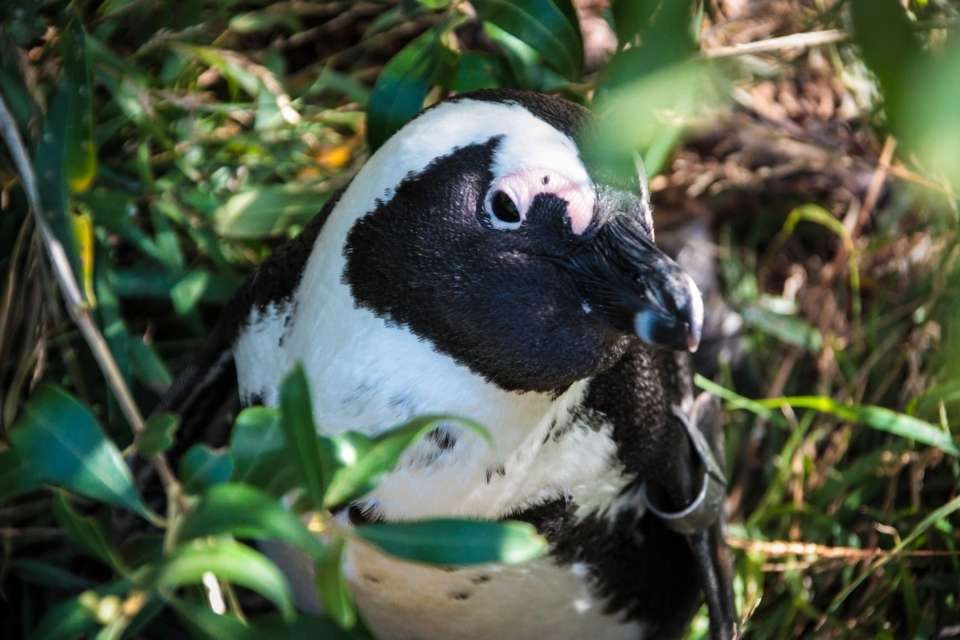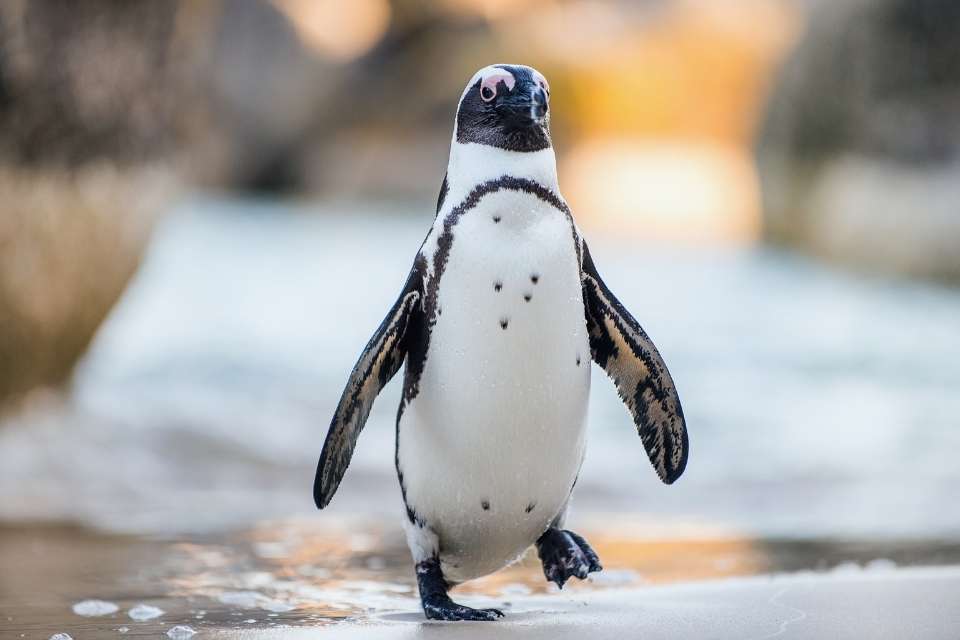When it comes to the animal kingdom, penguins are often admired for their adorable waddle and impressive swimming skills. But have you ever wondered about their eyesight? How well can penguins see? Can they see in color?
Yes, penguins have adapted eyes that provide them with good vision both in air and underwater and they have color vision and are sensitive to violet, blue, and green wavelengths of light.
Let’s dive into the fascinating world of penguin vision and explore their visual acuity, eye anatomy, and unique adaptations that help them navigate both the air and underwater environments.
Key Takeaways:
- Penguins have adapted eyes that allow them to see clearly in both air and underwater environments
- They have binocular vision, enabling them to accurately judge distances
- Penguins have color vision and are sensitive to violet, blue, and green wavelengths of light
- Their eyes have evolved unique adaptations, such as large pupils and oil droplets, to enhance their ability to detect light
- Penguin eye anatomy and function are critical for their foraging, predator avoidance, and overall survival
The Adaptations of Penguin Eyes
When it comes to their visual abilities, penguins have evolved some fascinating adaptations that make their eyes unique. Compared to most flying birds, penguins have relatively large eyes, allowing them to have greater focusing power. Additionally, their eyes have flat corneas, indicating that the majority of light refraction occurs in the lens.
The ring of bones that surrounds the penguin’s eye provides support to the muscles responsible for changing the shape of the lens, aiding in focusing.
But that’s not all. In larger penguin species, you’ll find large pupils that enable them to gather more light. Some penguins even possess pale green oil droplets and more rod photoreceptors, which enhance their ability to detect even the smallest amounts of light.
These remarkable adaptations in penguin eye structure and function allow them to thrive in their environments and fulfill their visual needs both in air and underwater.
Penguin Vision in Different Environments
Penguins are remarkable creatures with the ability to thrive in diverse environments. In order to navigate their surroundings effectively, penguins rely on their unique visual abilities in both air and water.
When penguins dive underwater to forage for food, they face various challenges that can hinder their vision. The light levels decrease significantly as they descend into the depths, making it difficult to see their prey.
Additionally, water selectively absorbs different wavelengths of light, further impairing their vision. The presence of suspended matter in the water also reduces optical transmission, adding another obstacle to their underwater vision. However, penguins have evolved remarkable adaptations that allow them to overcome these challenges.
Penguins’ eyes are specifically adapted to work well in these conditions, enabling them to see prey even in low light levels. Their visual system allows them to make the most of the available light and enhance their chance of survival.
These adaptations include features such as specialized retinal cells that are more sensitive to low light levels, allowing penguins to detect prey in dimly lit underwater environments. Their eyes also possess a large number of rod cells, which are especially effective in low light conditions.
On land, penguins’ vision is well-suited for their terrestrial activities. They have sharp focus and good visual acuity, allowing them to accurately assess their surroundings. This is particularly important when penguins are breeding and raising their young in their nesting colonies.
Some penguin species have even demonstrated diurnal foraging behavior, such as the Galápagos penguin. These penguins are active during the day and can dive deeper at night when hunting for bioluminescent prey.
Their visual system is finely tuned to detect and track the subtle light signals emitted by their prey, allowing them to navigate the depths effectively.
Overall, penguins possess remarkable vision that is well-suited to their varied environments. Whether in the air or underwater, penguins have adapted their visual abilities to ensure their survival and success in their respective habitats.
Penguin Visual System Evolution
Penguins, like other birds, have evolved their visual system over time, resulting in unique adaptations and capabilities. While their vision shares similarities with other avian species, as flightless birds, penguins have likely undergone specific evolutionary changes to meet the demands of their amphibious lifestyle.
During their long period of flightless evolution, penguins may have lost certain adaptations that were no longer necessary. However, they have also developed new visual capabilities that are essential for their survival in extreme environments.
The visual system of penguins plays a critical role in their behavior and ability to colonize different habitats. It enables them to navigate and forage efficiently, identify prey and predators, and communicate with their fellow colony members.
Through the course of evolution, penguins have honed their visual system to suit their unique needs, allowing them to thrive in harsh environments such as the Antarctic. The adaptations of their eyes have contributed to their remarkable ability to navigate both underwater and on land, ensuring their survival in diverse ecosystems.
Variation in Penguin Visual Systems
When it comes to penguins, there is notable variation in their visual systems. Different penguin species, each living in unique habitats and exhibiting distinct behaviors, may have differences in both eye anatomy and visual capabilities.
These differences can be attributed to various factors, including the penguin’s size, the depth at which they dive, and their prey hunting patterns.
Understanding the variation in penguin visual systems is crucial to comprehending their adaptation to specific ecological niches. By studying the variations in eye anatomy and visual capabilities, we can gain insights into how these adaptations assist penguins in their survival and thriving in their respective environments.
However, further research is needed to fully explore and comprehend the intricacies of the variation in penguin visual systems. By delving deeper into this subject, we can unravel the mysteries surrounding how different penguin species perceive the world around them.
This knowledge will shed light on the remarkable diversity and adaptations within the penguin species.
Conclusion
Penguins are fascinating creatures with remarkable visual capabilities. Their eyes have evolved unique adaptations that allow them to see clearly both in the air and underwater. With binocular vision and the ability to accurately judge distances, penguins can navigate their surroundings with precision.
One of the most interesting aspects of penguin vision is their ability to see in color. They are sensitive to violet, blue, and green wavelengths of light, and they may even have the ability to see ultraviolet light.
This enhanced color vision likely helps penguins in their search for prey and in recognizing other penguins.
While their visual acuity is impressive, penguins have a poorly developed sense of taste and more research is needed to understand their sense of smell. Nevertheless, understanding the visual capabilities of penguins is crucial for their survival.
It aids them in foraging for food, avoiding predators, and maintaining overall well-being.
Future studies should continue to explore the specific adaptations and variations in penguin visual systems across different species. Through this research, we can gain valuable insights into the evolutionary history of penguins and their ability to thrive in diverse environments.
FAQ
Do penguins have good eyesight?
Yes, penguins have adapted eyes that provide them with good vision both in air and underwater.
Can penguins see in color?
Yes, penguins have color vision and are sensitive to violet, blue, and green wavelengths of light, and possibly even ultraviolet light.
What adaptations do penguin eyes have?
Penguin eyes have unique anatomical and functional adaptations, such as relatively large size, flat corneas, and a ring of bones surrounding the eye for muscle support.
How well can penguins see in low light conditions?
Penguins have evolved to see prey even in low light levels, and some species have pale green oil droplets and more rod photoreceptors to enhance their ability to detect small amounts of light.
How does penguin vision differ underwater and on land?
Underwater, penguins have adapted to decreasing light levels and the selective absorption of light by water. On land, they have sharp focus and good vision.
What is the evolutionary history of penguin visual systems?
Penguins evolved their visual system from birds, likely losing certain adaptations for flight and developing new visual capabilities suited to their amphibious lifestyle.
Is there variation in penguin visual systems?
Yes, there is variation in the visual systems of different penguin species, likely influenced by factors such as habitat and hunting patterns.


